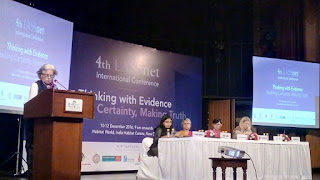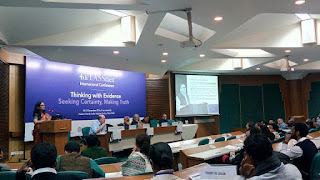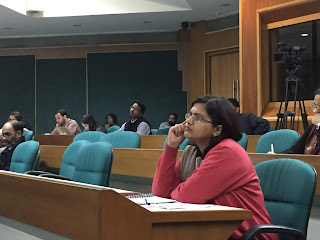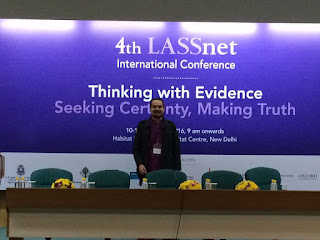Law and Social Sciences Research Network
1/11/23
LASSnet Webinar Series - 15 September 2022 - Guest Lecture : Lessons from Forensic Science :Why History Matters
LASS net Webinar Series - 13 October 2022 - Guest Lecture : Incarcerating the Innocent :A History of Undertrial Prisoners in Colonial India
LASSnet Webinar Series - 4 May 2022 - Guest Lecture : Ethnographic Notes on the Many Lives of the Emergency
LASSnet Webinar Series - 6 July 2022 - Book Discussion : An Ethnographic Approach to Forensic Medicine in India
LASSnet Webinar Series - 11 March 2022 - Book Discussion :Vernacular Rights Cultures: The Politics of Origins, Human Rights, And Gendered Struggles For Justice
LASSnet Webinar Series - 27 January 2022 - Panel Discussion : The Cow and the Elephant as “CATTLE ” in Indian Law, Policy and Practice
LASSnet Webinar Series - 17 December 2021 - Book Discussion : From Family to Police Force: Security and Belonging on a South Asian Border
LASSnet Webinar Series - 21 October 2021 - BOOK DISCUSSION: Naming Violence: Torture and Terrorism in Colonial South Asia
Please join us for a discussion on 21 October 2021 (Thursday), 5.30 PM IST
Theme
Naming Violence: Torture and Terrorism in Colonial South Asia.
Chair
Mayur Suresh, Senior Lecturer, School of Law, SOAS, University of London
Speakers
Radhika Singha, Eminent Historian and Professor of History, Formerly at Jawaharlal Nehru University, Delhi
Jinee Lokaneeta, Professor and Chair, Political Science and International Relations, Drew University
Joseph McQuade, Richard Charles Lee Postdoctoral Fellow in the Asian Institute at the Munk School of Global Affairs and Public Policy, University of Toronto
Deana Heath, Reader in Indian and Colonial History, University of Liverpool
LASSnet Webinar Series - 24 September 2021 - BOOK DISCUSSION ON: From the Colonial to the Contemporary: Images, Iconography, Memories, and Performances of Law in India’s High Courts
On behalf of LASSnet anchored at the Centre for the Study of Law and Governance, Jawaharlal Nehru University in collaboration with the Centre for Law and Humanities, JGLS, and Centre for Asian Legal Studies (CALS) SOAS, it gives us great pleasure to invite you for a panel discussion on Rahela Khorakiwala’s book, "From the Colonial to the Contemporary: Images, Iconography, Memories, and Performances of Law in India’s High Courts".
In conversation with
Rahela Khorakiwala
BOOK DISCUSSION ON:
From the Colonial to the Contemporary: Images, Iconography, Memories, and Performances of Law in India’s High Courts
SPEAKERS
Peter Goodrich, Professor of Law, Director, Program in Law and Humanities,
Cardozo Law
Kanika Sharma, Lecturer in Law, Director, Centre for Asian Legal Studies,
SOAS University of London
Swastee Ranjan, PhD, University of Sussex
CHAIR
Mani Shekhar Singh, Professor of Sociology, Jindal Global Law School,
O.P. Jindal Global University
When: Friday, 24 September 2021 at 7 pm IST (09:30 AM Eastern Time (US and Canada/2.30 pm London)
Topic: From the Colonial to the Contemporary: Images, Iconography, Memories, and Performances of Law in India’s High Courts
LASSNET Webinar - 8 July 2021 - Panel Discussion: The Making and Unmaking of Illegality : Ethnographic Commentaries on Scenes of Authoritarian Law
The Making and Unmaking of Illegality: Ethnographic Commentaries on Scenes of Authoritarian Law
This panel explores three areas of contestation in contemporary India: riot cases from Gujarat, foreigners tribunals in Assam and terrorism trials in Delhi. In bringing ethnographic attention to each of these judicial sites, the panel aims to understand how legality is made and unmade through everyday legal processes.
Speakers
Moyukh Chatterjee, Visiting Research Scholar at Middlebury College
Ordinary trials and the making of permanent minorities: Notes from inside the laboratory of Hindu nationalism
Fariya Yesmin, Doctoral Candidate at the Department of Humanities and Social Sciences, IIT Delhi
Understanding the everyday of a courtroom: Making of the foreigner in the Foreigner’s Tribunals in Assam, India
Mayur Suresh, Lecturer, SOAS
‘Terrorism’ v. technicalities: How terror-accused navigate trials proceedings
Chair & Discussant
Prof. Deepak Mehta, Dept of Sociology and Anthropology, Ashoka University
1/4/17
Judicial Reasoning and Judicial Behavior: Studying the Supreme Court of India: Call for Papers
12/15/16
12/14/16
The launch of the Indian Law Review at LASS 2016: Call for Papers
LASS in LiveLaw
http://www.livelaw.in/experts-assail-sentencing-policy-india/
http://www.livelaw.in/demonetisation-brought-legal-culpability-rbi-scrutiny-says-chirashree-das-gupta-academic-author/
Fourth Edition of LASSnet Conference 2016, 'Thinking With Evidence: Seeking Certainty, Making Truth'
The only conference of its kind in South Asia, the fourth edition of the Law and Social Sciences Research Network (LASSnet) took place from 10-12 December 2016 in Delhi.
LASSnet is a virtual network anchored at the Centre for the Study of Law and Governance, Jawaharlal Nehru University. LASSnet was established in order to bring together scholars, lawyers and doctoral researchers engaged in research and teaching of issues of law in different social sciences in contemporary South Asia in 2007.
The fourth edition of the LASSnet conference was organised by the Centre for the Study of Law and Governance, Jindal Global Law School of O.P. Jindal Global University, National Law University Delhi, Azim Premji University, Ambedkar University Delhi, the Indian Institute of Technology Delhi, and the Dickson Pool Transnational Law Institute at the King’s College, London. These institutions have been at the forefront of interdisciplinary research on law and have engaged with the role of law in the making of contemporary South Asia. More than 500 participants from all over the world attended the conference of over 60 sessions, and three featured panels engaged with what it means to think with ‘evidence’ in law and outside law.
Evidence has increasingly become an important category in our everyday lives, be it in the familial, political, or historical domain. The contested nature of evidence in law and life found animated debate at the conference. The theme of this conference, ‘Thinking with Evidence: Seeking Certainty, Making Truth’ pertains to the question of evidence and its role in legal and social research. For initiatives such as LASSnet, the imperative of thinking with evidence – in these times of virtual virality, forensic imaginaries and ephemeral archives – serves as a fertile ground on which we can stage discussions of the perils, pleasures, meanings and methods of inter-disciplinarity. ‘Thinking with Evidence’ allows engaging the possibilities of legal and social world, and how they invite discussions on our changing world and possible futures.
The conference was graced by many luminaries including C Raj Kumar, Ranbir Singh, Shyam Menon, Sudhir Krishnaswamy, Niraja Jayal, Julia Eckert, Ravinder Kaur, Vrinda Grover, Rebecca John, Peer Zumbassen, Shirin Rai, Lawrence Liang, Kalpana Kannabiran, Tarunabh Khaitan, Jawahar Raja, Abhinav Chandrachud, Shalini Randeria and Shireen Hassim.
LASSnet has highlighted the fact that although the domain of law has primarily been either a site of legal practice or of scholarship by lawyers alone, the emergence of LASSnet demonstrates how exciting and important it is to have conversations about law and justice from a range of disciplines. Scholarship in the field of law has grown to encompass a wide array of disciplines, methodologies, political perspectives and conceptual overlaps. If the initial movement was predominantly led by sociologists and then by scholars of literary studies, it now includes an ever expanding terrain of social science and humanities disciplines, including anthropology, digital studies, film and history. LASSnet has always seen law as an immensely fertile site to examine the social, the historical and the political. Previous LASSnet conferences were held in 2009, 2010 and 2012 at the Jawaharlal Nehru University (JNU), the Foundation for Liberal and Management Education (FLAME) in Pune and at the Department of Law, University of Peradeniya, Sri Lanka.
The opening talk at the 2016 conference was delivered by the eminent political theorist from Yale University, with Professors Shiv Visvanathan, Ramin Jahenbegloo, and Gitanjali Surendran on Gandhi’s ideas on non-violence. The closing contemplated the evidence of hope by crafting a discussion between the eminent legal scholars Indira Jaising, Babloo Loitongbam, Usha Ramanathan, Upendra Baxi, and Julia Eckert.
Three memorial panels were organised to recognise the contribution of the work and lives of three young academics, all of whom passed away in 2015. The panel dedicated to Dwijen Rangnekar marked his pathbreaking work in the field of geographical indicators. Another panel remembered Priya Thangarajah, a young Sri Lankan lawyer and researcher who made invaluable contributions to deepening our understanding of law and violence in times of conflict. And finally tribute was paid to U.S. based Pakistani scholar late Nasser Hussain whose work on law and emergency remains one of the most important contributions to the field in the region. The three panels engaged with the work of these scholars as a way of acknowledging their deep learning across histories, borders, disciplines and friendships.
The conference witnessed discussions around six books by emerging scholars from the LASSnet community on themes ranging from public interest litigation in India to debates around sentencing in criminal cases. One of the panels focused on a discussion around law and disability following the recent release of The India Social Development Report. The Indian Law Review, an academic journal on Indian law, was launched at the conference, also a product of the conversations at LASSnet over a decade. A syllabus workshop designed between King’s College London and O.P. Jindal Global Law School was held where mid-career teachers were invited to submit a syllabus of their own design for feedback and discussion.
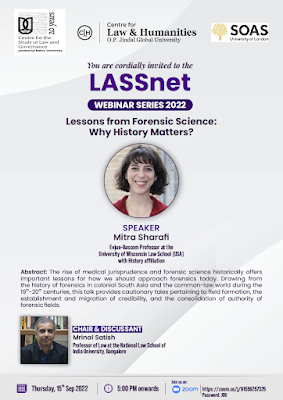



%20LASSnet%20Webinar%20Series%202022%20on%2011%20March%202022.jpg)

_17%20December%202021.jpg)
.jpg)










